五年级英语下册
人教版五年级下册英语第一单元知识点总结
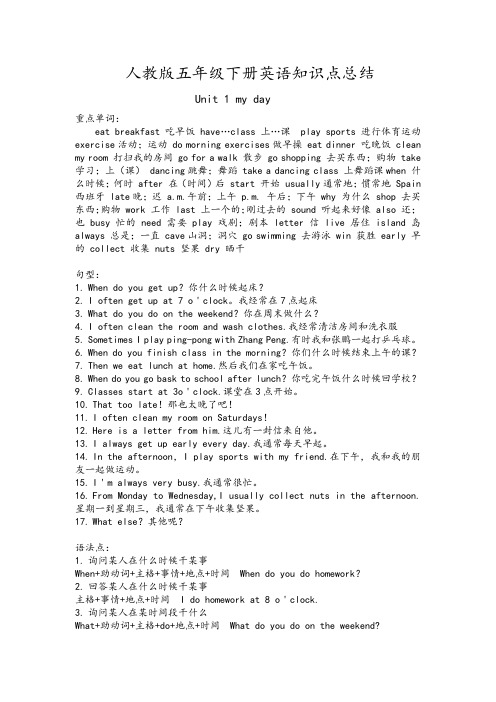
人教版五年级下册英语知识点总结Unit 1 my day重点单词:eat breakfast吃早饭 have…class上…课 play sports进行体育运动exercise活动;运动 do morning exercises做早操 eat dinner 吃晚饭 clean my room 打扫我的房间 go for a walk 散步 go shopping 去买东西;购物 take 学习;上(课) dancing跳舞;舞蹈 take a dancing class 上舞蹈课when 什么时候;何时 after 在(时间)后 start 开始 usually通常地;惯常地 Spain 西班牙 late晚;迟 a.m.午前;上午 p.m. 午后;下午 why 为什么 shop 去买东西;购物 work 工作 last 上一个的;刚过去的 sound 听起来好像 also 还;也 busy 忙的 need 需要 play 戏剧;剧本 letter 信 live 居住 island 岛always 总是;一直 cave山洞;洞穴 go swimming 去游泳 win 获胜 early 早的 collect 收集 nuts 坚果 dry 晒干句型:1.When do you get up?你什么时候起床?2.I often get up at 7 o'clock。
我经常在7点起床3.What do you do on the weekend?你在周末做什么?4.I often clean the room and wash clothes.我经常清洁房间和洗衣服5.Sometimes I play ping-pong with Zhang Peng.有时我和张鹏一起打乒乓球。
6.When do you finish class in the morning?你们什么时候结束上午的课?7.Then we eat lunch at home.然后我们在家吃午饭。
五年级下册英语单词表
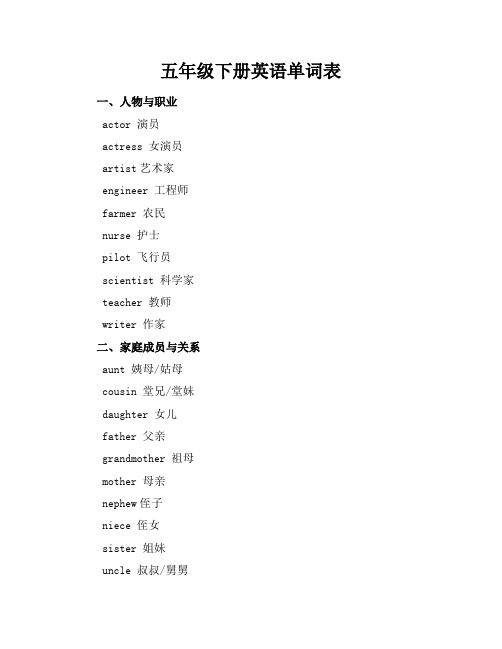
五年级下册英语单词表一、人物与职业actor 演员actress 女演员artist艺术家engineer 工程师farmer 农民nurse 护士pilot 飞行员scientist 科学家teacher 教师writer 作家二、家庭成员与关系aunt 姨母/姑母cousin 堂兄/堂妹daughter 女儿father 父亲grandmother 祖母mother 母亲nephew侄子niece 侄女sister 姐妹uncle 叔叔/舅舅三、身体部位与感觉 arm 手臂ear 耳朵eye 眼睛foot 脚hand 手head 头leg 腿mouth 嘴巴nose 鼻子stomach 肚子happy 快乐的sad 悲伤的tired 疲惫的excited 兴奋的angry 生气的四、食物与饮料apple 苹果banana 香蕉bread 面包cake 蛋糕chicken 鸡肉coffee 咖啡juice 果汁milk 牛奶rice 米饭water 水五、学校与学习book 书classroom 教室dictionary 字典 exam 考试library 图书馆pen 钢笔ruler 尺子school 学校study 学习六、日常活动与时间 breakfast 早餐dinner 晚餐lunch 午餐play 玩耍read 阅读sleep 睡觉swim 游泳watch 观看morning 早晨afternoon 下午evening 晚上七、天气与自然cloud 云rain 雨snow 雪sun 太阳wind 风mountain 山river 河sea 海tree 树flower 花本单词表涵盖了五年级下册英语课程中的核心词汇,旨在帮助学生更好地掌握英语基础知识,为日常交流和学习打下坚实基础。
在使用过程中,建议学生结合实际语境进行记忆,提高单词运用能力。
八、地点与方向airport 机场bank 银行hospital 医院library 图书馆museum 博物馆park 公园post office 邮局restaurant 餐厅school 学校supermarket 超市 left 左边right 右边front 前面back 后面up 上down 下near 附近far 远处九、衣物与颜色shirt 衬衫pants 裤子dress 连衣裙skirt 裙子shoes 鞋子socks 袜子hat 帽子coat 大衣gloves 手套scarf 围巾red 红色blue 蓝色green 绿色yellow 黄色purple 紫色orange 橙色black 黑色white 白色十、形容词与副词 big 大的small 小的tall 高的short 矮的fat 胖的thin 瘦的happy 快乐的sad 悲伤的hot 热的cold 冷的fast 快的slow 慢的carefully 小心地 loudly 大声地quietly 安静地十一、动词与动作 eat 吃drink 喝run 跑walk 走jump 跳read 读write 写listen 听speak 说play 玩learn 学习help 帮助clean 打扫十二、日常用语与表达Goode! 再见!I'm fine, thank you. 我很好,谢谢。
英语五年级下册全部单词和句子
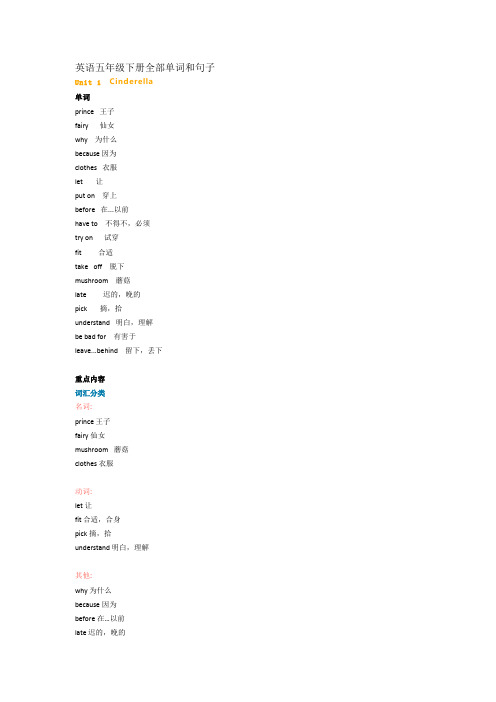
英语五年级下册全部单词和句子Unit 1Cinderella单词prince 王子fairy 仙女why 为什么because 因为clothes 衣服let 让put on 穿上before 在...以前have to 不得不,必须try on 试穿fit 合适take off 脱下mushroom 蘑菇late 迟的,晚的pick 摘,拾understand 明白,理解be bad for 有害于leave...behind 留下,丢下重点内容词汇分类名词:prince 王子fairy 仙女mushroom 蘑菇clothes 衣服动词:let 让fit 合适,合身pick摘,拾understand 明白,理解其他:why 为什么because因为before在…以前late 迟的,晚的短语go to the party 去参加聚会put on 穿上take off 脱下come back 回来have a good time 玩得很开心have to 必须,不得不try on 试穿be bad for 有害的in the forest 在森林里under a tree 在一棵树下look so nice 看起来如此好看leave... behind 留下,丢下惯用表达式1. Let me help you.让我帮助你。
2. Sorry. 对不起。
3. It fits! 它合脚!4. Hurry up.快点儿。
5. Look! 看!6. Why? 为什么?7. What a pity! 多么遗憾啊!知识点精析1.询问对方为何有某种情绪、感觉的句型一Why are you(so)…?【课文应用】 Why are you so sad,dear?你为什么如此难过,亲爱的?Because I can't go to the party. 因为我不能去参加聚会【句型结构】问句: Why are you (so)+表示情绪或感觉的形容词(sad,worried,happy…)?答语: Because +原因【重点解析】why是疑问词,意为“为什么”,用来询问原因。
五年级下册英语单词(全)

五年级下册英语单词(全)第一单元Unit 1do morning exercises(晨练)eat breakfast(吃早饭)have english class(上英语课)play sports(进行体育运动)eat dinner(吃晚饭)when(什么时候)evening(夜晚;晚上)get up(起床)at(在……点钟)usually(通常;一般)noon (中午)climb mountains(爬山)go shopping(购物;买东西)play the piano(弹钢琴)visit grandparents(看望祖父母)go hiking(去远足)weekend(周末)often(经常)sometimes(有时候)第二单元Unit 2spring(春天)summer(夏天)fall(秋天)winter(冬天)season(季节)which(哪一个)best(最;极)swim(游泳)fly kites(放风筝)skate(滑冰;滑冰鞋)make a snowman (堆雪人)plant trees(种树)why(为什么)because(因为)sleep(睡觉)第三单位Unit 3Jan./January(一月)Feb./February(二月)Mar./March (三月)Apr./April(四月)May(五月)June(六月)July (七月)Aug./Augest(八月)Sept./September(九月)Oct./October(十月)Nov./November(十一月)Dec./December(十二月)birthday(生日)uncle(叔叔;舅舅)her(她的)date(日期)第四单元Unit 4draw pictures(画画)cook dinner(做饭)read a book(看书)answer the phone(接电话)listen to music9(听音乐)clean the room(打扫房间)write a letter(写信)grandpa (爷爷;外公)write an e-mail(写电子邮件)mom(妈妈)study(书房)第五单位Unit 5fly(飞)jump(跳)walk(走)run(跑)swim(游泳)kangaroo(袋鼠)sleep(睡觉)climb(往上爬)fight(打斗)swing(荡;荡秋千)drink water(喝水)第六单位Unit 6。
小学五年级英语下册

小学五年级英语下册Unit 1: My DayLesson 1: Daily RoutinesIn Lesson 1, students will learn about daily routines and time expressions in English. The main objective of this lesson is to help students talk about their daily activities using the present simple tense.Vocabulary•Get up•Brush teeth•Wash face•Have breakfast•Go to school•Have lunch•Do homework•Play games•Watch TV•Go to bedStructures•I get up at…•I brush my teeth…•I wash my face…•I have breakfast…•I go to school…•I have lunch…•I do my homework…•I play games…•I watch TV…•I go to bed…Example Sentences1.I get up at 7 o’clock.2.I brush my teeth after breakfast.3.I wash my face before going to bed.4.I have lunch at 12 o’clock.5.I do my homework after school.6.I play games in the evening.7.I watch TV at night.8.I go to bed at 9 o’clock.Activities1.Warm-up: The teacher asks students about their daily routines, usingthe sentence structures learned in class.2.Presentation: The teacher presents new vocabulary using picturesand gestures.3.Practice: Students practice saying their daily routines in pairs.4.Group Activity: Students work in groups to create a poster showingtheir daily routines.5.Wrap-up: Students present their posters to the class.Unit 2: At the ZooLesson 1: AnimalsIn Lesson 1, students will learn about animals at the zoo. The main objective of this lesson is to help students identify and describe different animals in English.Vocabulary•Lion•Tiger•Elephant•Giraffe•Monkey•Kangaroo•Zebra•Panda•Polar bear•CrocodileStructures•It is a lion.•It is a tiger.•It is an elephant.•It is a giraffe.•It is a monkey.•It is a kangaroo.•It is a zebra.•It is a panda.•It is a polar bear.•It is a crocodile.Example Sentences1.The lion is big and strong.2.The tiger has stripes.3.The elephant has a long trunk.4.The giraffe has a long neck.5.The monkey likes to climb trees.6.The kangaroo can jump high.7.The zebra has black and white stripes.8.The panda is black and white.9.The polar bear lives in the cold.10.The crocodile has sharp teeth.Activities1.Warm-up: The teacher shows pictures of animals and asks students toidentify them.2.Presentation: The teacher introduces new vocabulary using flashcardsand encourages students to describe the animals.3.Practice: Students practice asking and answering questions aboutanimals in pairs.4.Vocabulary Game: The teacher plays a game where students have toguess the animal based on its description.5.Wrap-up: The teacher asks students to draw their favorite animal anddescribe it to the class.Unit 3: My HobbiesLesson 1: SportsIn Lesson 1, students will learn about different sports and hobbies. The main objective of this lesson is to introduce new sports vocabulary and help students talk about their hobbies in English.Vocabulary•Football•Basketball•Swimming•Tennis•Cycling•Dancing•Singing•Drawing•Reading•Writing•I like playing football.•I like playing basketball.•I like swimming.•I like playing tennis.•I like cycling.•I like dancing.•I like singing.•I like drawing.•I like reading.•I like writing.Example Sentences1.I like playing football with my friends.2.I like shooting hoops in the basketball court.3.I enjoy swimming in the pool.4.I love playing tennis on the weekends.5.I enjoy cycling in the park.6.I like dancing to my favorite songs.7.I enjoy singing in the school choir.8.I like drawing pictures of nature.9.I love reading adventure books.10.I enjoy writing stories in my free time.Activities1.Warm-up: The teacher asks students about their favorite sports andhobbies.2.Presentation: The teacher presents new sports vocabulary usingpictures and gestures.3.Practice: Students practice saying sentences about their hobbies inpairs.4.Group Activity: Students work in groups to create a poster about theirfavorite sports or hobbies.5.Wrap-up: Students present their posters to the class and explain whythey like their chosen activity.Unit 4: Our CommunityLesson 1: Places in a CityIn Lesson 1, students will learn about different places in a city. The main objective of this lesson is to help students identify and describe various locations in English.•Park•School•Hospital•Library•Supermarket•Post office•Cinema•Restaurant•Bank•MuseumStructures•The park is a great place to play.•We go to school to learn.•The hospital is where people go when they’re sick.•The library is a quiet place to read and study.•We buy groceries at the supermarket.•The post office is where we send letters and packages.•We watch movies at the cinema.•We eat at restaurants.•We keep our money in the bank.•We visit the museum to learn about history.Example Sentences1.I love going to the park to play soccer with my friends.2.We learn math and English at school.3.If you’re feeling unwell, you should go to the hospital.4.The library is a perfect place to find books and study.5.We go to the supermarket to buy food for our family.6.The post office is where we mail our letters and packages.7.The cinema is a fun place to watch movies with friends.8.We enjoy eating at different restaurants in our city.9.We deposit our money in the bank for safekeeping.10.The museum has interesting exhibi ts about our country’s history. Activities1.Warm-up: The teacher shows pictures of different places and asks students to identify them.2.Presentation: The teacher introduces new vocabulary using flashcards and encourages students to describe the locations.3.Practice: Students practice asking and answering questions about different places in pairs.4.Vocabulary Game: The teacher plays a game where students have to match the place with its description.5.Wrap-up: The teacher asks students to draw a map of their community, marking different places and describing them.。
五年级英语下册重点知识归纳

五年级英语下册重点知识归纳一、单词和词组1. family - 家庭2. school - 学校3. friend - 朋友4. teacher - 老师5. brother - 兄弟6. sister - 姐妹7. father - 父亲8. mother - 母亲9. grandfather - 爷爷10. grandmother - 奶奶11. cousin - 堂兄弟/堂姐妹12. pet - 宠物13. bag - 书包14. pencil - 铅笔15. pen - 钢笔16. book - 书籍17. ruler - 尺子18. notebook - 笔记本19. desk - 书桌20. chair - 椅子二、语法知识1. 一般现在时- 表示习惯、常规或客观事实。
- 构成:主语 + 动词原形 (+ 其他)。
- 例句:I eat breakfast at 7 o'clock every morning.(我每天早上7点吃早餐。
)2. 一般过去时- 表示过去某个时间里的动作或状态。
- 构成:主语 + 动词过去式 (+ 其他)。
- 例句:He played soccer with his friends yesterday.(昨天他和他的朋友们一起踢足球。
)3. 现在进行时- 表示现在正在进行的动作。
- 构成:主语 + be 动词(am,is,are)+ 动词现在分词 (+ 其他)。
- 例句:They are watching a movie in the cinema.(他们正在电影院看电影。
)4. 一般将来时- 表示将来要发生的动作或存在的状态。
- 构成:主语 + will + 动词原形 (+ 其他)。
- 例句:I will visit my grandparents next weekend.(下周末我要去拜访我的祖父母。
)5. 形容词的比较级和最高级- 比较级用来比较两个事物之间的差异。
人教版五年级下册英语第一单元知识点
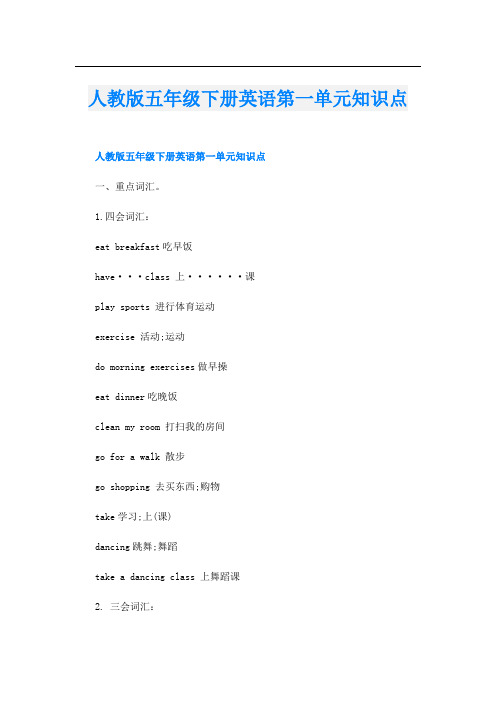
人教版五年级下册英语第一单元知识点人教版五年级下册英语第一单元知识点一、重点词汇。
1.四会词汇:eat breakfast吃早饭have···class 上······课play sports 进行体育运动exercise 活动;运动do morning exercises做早操eat dinner吃晚饭clean my room 打扫我的房间go for a walk 散步go shopping 去买东西;购物take学习;上(课)dancing跳舞;舞蹈take a dancing class 上舞蹈课2. 三会词汇:when什么时候 after 在(时间)后 start 开始 usually 通常地;惯常地Spain 西班牙 late 晚;迟a.m. 午前;上午p.m. 午后;下午why 为什么 shop 去买东西;购物 work 工作last 上一个的;刚过去的sound 听起来好像also 还;也 busy 忙的 need 需要 play 戏剧;剧本letter 信 live居住 island 岛always 总是;一直 cave 山洞;洞穴go swimming 去游泳 win 获胜二、其他日常活动。
get up起床eat lunch吃午饭go to bed 上床睡觉wash my face洗脸wash my clothes 洗我的衣服watch TV看电视play ping-pong打乒乓球play the pipa弹琵琶go swimming去游泳go running去跑步do homework 做作业do kung fu练武术play football踢足球play basketball打篮球三、频度副词。
always总是,一直(100%) usually通常(80%) often 经常(60%) sometimes(30%)有时四、疑问词。
五年级英语书下册单词

五年级英语书下册单词人教版五年级英语下册单词表。
Unit 1.- eat breakfast [iːt ˈbrekfəst] (v. 短语) 吃早饭。
- have…class [hæv klɑːs] (v. 短语) 上……课。
- play sports [pleɪ spɔːts] (v. 短语) 进行体育运动。
- exercise [ˈeksəsaɪz] (v. & n.) 活动;运动。
- do morning exercises [duːˈmɔːnɪŋˈeksəsaɪz] (v. 短语) 做早操。
- eat dinner [iːt ˈdɪnə(r)] (v. 短语) 吃晚饭。
- clean my room [kliːn maɪ ruːm] (v. 短语) 打扫我的房间。
- go for a walk [ɡəʊ fɔː(r) ə wɔːk] (v. 短语) 散步。
- go shopping [ɡəʊˈʃɒpɪŋ] (v. 短语) 去买东西;购物。
- take [teɪk] (v.) 学习;上(课)- dancing [ˈdɑːnsɪŋ] (n.) 跳舞;舞蹈。
- take a dancing class [teɪk əˈdɑːnsɪŋ klɑːs] (v. 短语) 上舞蹈课。
Unit 2.- spring [sprɪŋ] (n.) 春天。
- summer [ˈsʌmə(r)] (n.) 夏天。
- autumn [ˈɔːtəm] (n.) 秋天。
- winter [ˈwɪntə(r)] (n.) 冬天。
- season [ˈsiːzn] (n.) 季节。
- picnic [ˈpɪknɪk] (n.) 野餐。
- go on a picnic [ɡəʊɒn əˈpɪknɪk] (v. 短语) 去野餐。
- pick [pɪk] (v.) 摘;采集。
- pick apples [pɪk ˈæplz] (v. 短语) 摘苹果。
小学英语部编版五年级下册全册课文内容归纳
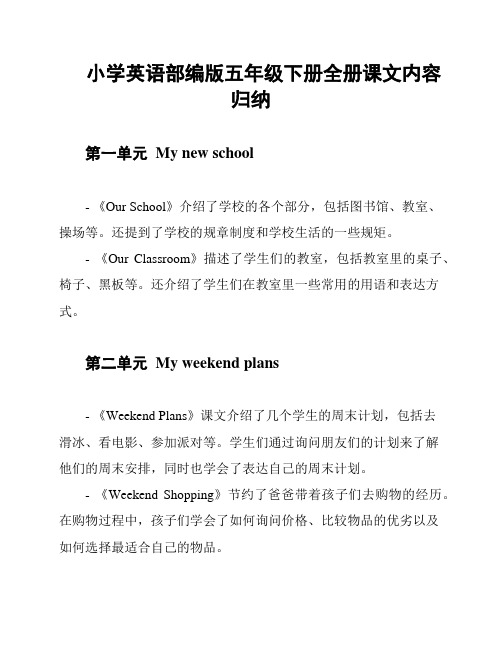
小学英语部编版五年级下册全册课文内容归纳第一单元 My new school- 《Our School》介绍了学校的各个部分,包括图书馆、教室、操场等。
还提到了学校的规章制度和学校生活的一些规矩。
- 《Our Classroom》描述了学生们的教室,包括教室里的桌子、椅子、黑板等。
还介绍了学生们在教室里一些常用的用语和表达方式。
第二单元 My weekend plans- 《Weekend Plans》课文介绍了几个学生的周末计划,包括去滑冰、看电影、参加派对等。
学生们通过询问朋友们的计划来了解他们的周末安排,同时也学会了表达自己的周末计划。
- 《Weekend Shopping》节约了爸爸带着孩子们去购物的经历。
在购物过程中,孩子们学会了如何询问价格、比较物品的优劣以及如何选择最适合自己的物品。
- 《Busy Weekend》故事中的孩子们都有一个忙碌的周末。
他们分别参加了电影俱乐部、游泳班和英语角。
通过这个故事,我们了解了孩子们丰富多彩的课余生活。
第三单元 My favorite subject- 《My Favorite Subject》课文中学生们谈论了自己最喜欢的学科,并表达了自己对不同学科的喜好和理由。
他们之间互相交流和讨论,分享了不同学科的特点和魅力。
- 《Music Class》课文介绍了一个音乐课堂上的情景,老师教导学生们如何演奏乐器和唱歌。
学生们通过参与音乐课堂活动,培养了音乐欣赏和艺术表达的能力。
- 《Art Class》课文中学生们在美术课上研究绘画和创作,他们展示了自己的作品并互相欣赏。
通过艺术创作,学生们培养了创造力和审美观。
第四单元 A picnic in the park- 《A Picnic Plan》课文描述了一场学生们组织的郊游活动,包括选择地点、准备食物和活动安排。
学生们通过一起筹划和组织活动,锻炼了团队合作和沟通能力。
- 《A Picnic in the Park》故事中的孩子们在公园里举行了一场愉快的野餐活动。
人教版五年级英语下册全册知识点总结

千里之行,始于足下。
人教版五年级英语下册全册知识点总结人教版五年级英语下册总结1. 词汇:- 人称代词:I, you, he, she, it, we, they- 动词:be动词 (am, is, are), 常见动词 (like, have, go, do, see, eat, play)- 数字:1-1000- 家庭成员:father, mother, brother, sister, grandfather, grandmother- 学科名称:English, Chinese, math, science, P.E., music, art - 学习用品:book, pencil, eraser, ruler, sharpener, bag- 季节:spring, summer, autumn, winter- 食物:rice, noodles, bread, eggs, milk, fruits, vegetables - 动物:dog, cat, bird, fish, rabbit, panda, monkey- 蔬菜:carrot, tomato, potato, cabbage, cucumber, onion- 水果:apple, banana, orange, pear, grape, strawberry2. 句型:- What's your name?/My name is...- How old are you?/I'm ... years old.- Where are you from?/I'm from ...- What do you like?/I like ...- Can you ...?/Yes, I can./No, I can't.- What's the date today?/Today is ...- What's the weather like?/It's ...- Do you have ...?/Yes, I do./No, I don't.第1页/共2页锲而不舍,金石可镂。
五年级下册英语单词表
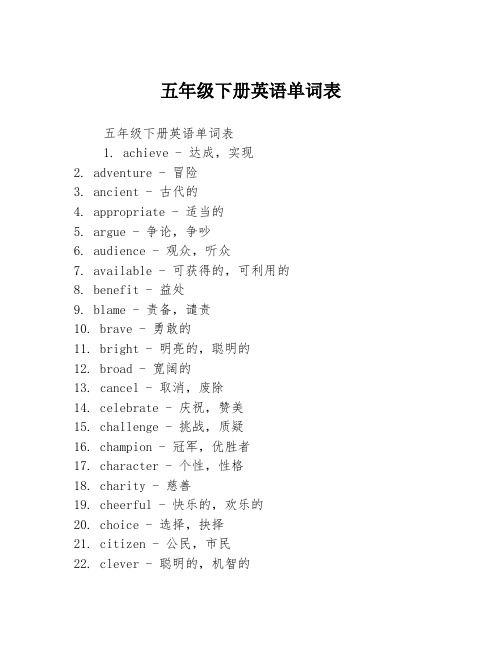
五年级下册英语单词表五年级下册英语单词表1. achieve - 达成,实现2. adventure - 冒险3. ancient - 古代的4. appropriate - 适当的5. argue - 争论,争吵6. audience - 观众,听众7. available - 可获得的,可利用的8. benefit - 益处9. blame - 责备,谴责10. brave - 勇敢的11. bright - 明亮的,聪明的12. broad - 宽阔的13. cancel - 取消,废除14. celebrate - 庆祝,赞美15. challenge - 挑战,质疑16. champion - 冠军,优胜者17. character - 个性,性格18. charity - 慈善19. cheerful - 快乐的,欢乐的20. choice - 选择,抉择21. citizen - 公民,市民22. clever - 聪明的,机智的23. climate - 气候,气氛24. comfort - 舒适,安慰25. community - 社区,群体26. compete - 竞争,比赛27. congratulate - 祝贺28. connect - 连接,联系29. consider - 考虑,认真思考30. cooperation - 合作,协作31. courage - 勇气32. creative - 创造性的,有创意的33. curious - 好奇的,求知欲强的34. customer - 顾客,客户35. deaf - 聋的36. decide - 决定,决策37. decorate - 装饰,装修38. delicious - 美味的39. demonstrate - 展示,表现40. deny - 否认,否定41. describe - 描述,形容42. design - 设计,构思43. destroy - 毁坏,破坏44. develop - 发展,培养45. differ - 不同于,有差异46. difficult - 困难的47. disaster - 灾难,悲惨的事情48. discuss - 讨论,商量49. disease - 疾病,病理50. displease - 不悦,不高兴51. donate - 捐赠52. double - 双倍的,加倍的53. education - 教育,培养54. embarrass - 令人尴尬,令人难堪55. encourage - 鼓励,激励56. enemy - 敌人,仇敌57. enormous - 巨大的,庞大的58. entertain - 娱乐,招待59. environment - 环境,自然环境60. equal - 平等的,相等的61. equipment - 设备,装备62. escape - 逃脱,逃避63. excellent - 优秀的,杰出的64. experience - 经验,体验65. experiment - 实验,试验66. explain - 解释,说明67. explore - 探索,探究68. extend - 延伸,扩展69. fact - 事实70. fairy - 仙女,精灵71. familiar - 熟悉的,常见的72. fantastic - 极好的,极棒的73. fashion - 时尚,时装74. feature - 特征,特点75. fearless - 无畏的,勇敢的76. festival - 节日,庆典77. field - 领域,田地78. fitness - 健康,适合79. focus - 焦点,集中80. forever - 永远地81. freedom - 自由,自主82. fresh - 新鲜的,清新的83. friendly - 友好的,和蔼可亲的84. fun - 有趣的,好玩的85. future - 未来,将来86. generous - 慷慨的,大方的87. gentle - 温和的,和善的88. giant - 巨大的,庞大的89. goal - 目标,目的90. grateful - 感激的,感谢的91. growth - 增长,发展92. habit - 习惯,惯例93. handsome - 英俊的,漂亮的94. happy - 开心的,快乐的95. harvest - 收获,收成96. healthy - 健康的,有益健康的97. heart - 心脏,心灵98. height - 高度,身高99. hero - 英雄,勇士100. honest - 诚实的,正直的101. honor - 荣誉,尊敬102. hope - 希望,期望103. huge - 巨大的,庞大的104. humor - 幽默,诙谐105. hurry - 着急,急忙106. idea - 想法,主意107. important - 重要的,关键的108. incredible - 难以置信的,惊人的109. industry - 行业,工业110. influence - 影响,感染111. injury - 伤害,损害112. insect - 昆虫,虫子113. interest - 兴趣,关注114. international - 国际的115. interview - 面试,采访116. introduce - 介绍,引进117. invest - 投资,投入118. involved - 相关的,涉及的119. joyful - 高兴的,愉快的120. judge - 法官,裁判员121. jump - 跳跃,跳跃的动作122. justice - 公正,正义123. knowledge - 知识,认识124. laugh - 笑,大笑125. leader - 领袖,领导者126. learn - 学习,了解127. leisure - 休闲,空闲128. lesson - 课程,课,功课129. library - 图书馆,藏书楼130. light - 光,灯光131. limit - 限制,界限132. listen - 听,倾听133. lively - 生动的,活泼的134. locate - 位于,所在地135. lonely - 孤独的,孤寂的136. lovely - 可爱的,美好的137. loyal - 忠诚的,忠心的138. lucky - 幸运的,好运的139. magic - 魔法,神奇的140. magnificent - 宏伟的,壮丽的141. manner - 方式,举止,风度142. marry - 结婚,嫁娶143. match - 比赛,比詹144. medicine - 药,医学145. meeting - 会议,会谈146. memory - 记忆,回忆147. message - 消息,信息148. mighty - 强大的,有力的149. mind - 心智,头脑150. miracle - 奇迹,神迹151. mirror - 镜子,反射152. mistake - 错误,疏忽153. moderate - 稳健的,适度的154. moment - 瞬间,片刻155. money - 钱,货币156. mood - 情绪,心境157. more - 更多的,更大的158. mountain - 山,山脉159. move - 移动,活动160. music - 音乐,乐曲161. mystery - 神秘的事物,秘密162. natural - 自然的,天然的163. necessary - 必要的,必需的164. negotiate - 谈判,协商165. neighbor - 邻居,街坊166. nervous - 紧张的,神经过敏的167. news - 新闻,新闻报道168. night - 夜晚,夜间169. noble - 高贵的,贵族的170. normal - 正常的,标准的171. note - 笔记,注释,纸条172. notice - 注意,通知,布告173. occasion - 场合,时机174. ocean - 海洋,大海175. offer - 提供,供给176. official - 官方的,公务的177. operation - 手术,操作178. opportunity - 机会,时机179. ordinary - 普通的,平凡的180. organize - 组织,策划181. outstanding - 杰出的,优秀的182. over - 在…上方,过度183. own - 拥有,自己的184. pack - 包,袋,行李185. parade - 游行,阅兵186. participate - 参加,参与187. particular - 特定的,个别的188. patient - 耐心的,病人的189. peace - 和平,平静190. peculiar - 特殊的,古怪的191. perform - 表演,表现,执行192. perhaps - 或许,也许193. personal - 个人的,私人的194. persuade - 说服,劝说195. pet - 宠物,爱抚196. photograph - 摄影,照片197. plant - 植物,工厂198. poem - 诗,韵文199. point - 点,尖端,观点200. polite - 礼貌的,有礼貌的201. popular - 流行的,受欢迎的202. possible - 可能的,可能存在的203. powerful - 强大的,有力的204. practical - 实用的,实际的205. prefer - 喜欢,更喜欢206. prepare - 准备,预备207. present - 当前的,目前的,礼物208. president - 总统,主席209. pretty - 相当的,漂亮的210. primary - 主要的,基本的211. prince - 王子,亲王212. principle - 原则,原理213. print - 印刷,印花214. private - 私人的,私密的215. problem - 问题,难题216. produce - 生产,制造217. product - 产品,产物218. professional - 专业的,专业人员219. progress - 进展,进步220. project - 项目,计划221. promise - 承诺,许诺222. pronounce - 发音,宣布223. protect - 保护,爱护224. proud - 骄傲的,自豪的225. provide - 提供,供应226. publish - 出版,公布227. pupil - 学生,小学生228. purpose - 目的,意图229. quick - 迅速的,敏捷的230. quiet - 安静的,寂静的231. race - 种族,比赛232. radiate - 发光,辐射233. rain - 雨,下雨234. rather - 相当,有点,宁愿235. reaction - 反应,回应236. read - 读,阅读237. ready - 准备好的,随时可用的238. realize - 实现,领悟,认识到239. reason - 理由,原因240. receive - 接受,收到241. recommend - 推荐,建议242. record - 记录,唱片,纪录243. recover - 恢复,痊愈244. reduce - 减少,降低245. refer - 引用,涉及246. reflect - 反射,反映247. regard - 关系,关注,认为248. regular - 通常的,规则的249. relationship - 关系,联络250. release - 释放,发行251. rely - 依赖,信任252. remain - 剩余,保持不变253. remember - 记得,回想起254. repair - 修理,修补255. repeat - 重复,复述256. replace - 代替,替换257. reply - 回答,回复258. report - 报告,汇报259. request - 请求,要求260. rescue - 营救,解救261. research - 研究,调查262. reserve - 储备,保留263. respect - 尊敬,尊重264. responsible - 有责任的,负责的265. rest - 休息,剩余266. return - 返回,归还267. reveal - 揭示,揭露268. rich - 富裕的,丰富的269. ride - 骑,乘坐270. right - 正确的,权利271. risk - 风险,危险272. robot - 机器人273. rule - 规则,统治274. safe - 安全的,保险的275. same - 相同的,相似的276. save - 节约,救援277. say - 说,表达278. school - 学校,学院279. science - 科学,自然科学280. scratch - 抓,刮,擦伤281. search - 搜查,寻找282. secret - 秘密的,机密的283. security - 安全,保卫284. seize - 抓住,夺取285. select - 选择,挑选286. self - 自我,自己287. send - 发送,派遣288. sense - 感觉,意义289. separate - 分开的,单独的290. serve - 服务,招待291. set - 集合,套装,设置292. settle - 解决,安置293. several - 几个,若干个294. shake - 摇动,颤抖295. share - 分享,共享296. shelter - 庇护所,避难所297. shine - 发光,照耀298. shoe - 鞋,鞋子299. shoot - 射击,拍摄300. shop - 商店,店铺301. show - 表演,展览,展示302. sight - 视觉,景象303. sign - 标记,符号,签名304. silent - 沉默的,寂静的305. silver - 银,银色的306。
人教版小学英语五年级下册各单元知识点

人教版小学英语五年级下册各单元知识点Unit 1: My dayIn this unit, students learn to talk about their daily routines and the time in English. They also learn to express their likes and dislikes about different activities.Some of the key vocabulary words and phrases include:- Get up- Have breakfast- Go to school- Have lunch- Have dinner- Watch TV- Play games- Read books- Do homework- Brush teeth- Go to bedStudents are introduced to the verb "to be" and learn how to make simple sentences with it, such as "I am happy" or "He is tired". They also practice asking and answering questions using "what", "when", and "where".Unit 2: Colors and clothesIn this unit, students learn to identify and name colors, clothing items, and accessories in English. They also learn to describe their own clothing and what they are wearing.Some of the key vocabulary words and phrases include:- Red- Blue- Green- Yellow- Orange- Purple- Pink- White- Black- T-shirt- Dress- Pants- Skirt- Shoes- Socks- Hat- Bag- SunglassesStudents learn about the use of prepositions such as "on", "in", and "under" to describe clothing and daily routines. They also practice using adjectives to describe colors and clothing, and learn to ask and answer questions such as "What color is your shirt?" and "What are you wearing today?"Unit 3: Food and drinksIn this unit, students learn to talk about different types of food and drinks in English. They also learn about healthy eating habits and meal times.Some of the key vocabulary words and phrases include:- Pizza- Sandwich- Rice- Noodles- Salad- Fruit- Vegetables- Juice- Milk- Water- Breakfast- Lunch- Dinner- SnackStudents learn about the use of countable and uncountable nouns when talking about food and drinks. They also practice using the articles "a", "an", and "the" correctly. They learn to express likes and dislikes about different foods and drinks using the verb "to like" and "to dislike".Unit 4: Holidays and festivalsIn this unit, students learn about different holidays and festivals celebrated around the world. They learn to talk about the traditions, customs, and symbols associated with these celebrations.Some of the key vocabulary words and phrases include:- Christmas- Easter- Halloween- New Year- Valentine's Day- Thanksgiving- Dragon Boat Festival- Mid-Autumn Festival- Lantern Festival- Traditions- Customs- Symbols- FireworksStudents learn to ask and answer questions about holidays and festivals. They learn to use vocabulary related to greetings, gifts, and decorations. They also practice using the verb "to celebrate" to talk about different celebrations.Unit 5: Animals and petsIn this unit, students learn about different types of animals and pets. They learn to describe their appearance, behavior, and habitat. Some of the key vocabulary words and phrases include:- Dog- Cat- Fish- Bird- Rabbit- Hamster- Snake- Monkey- Elephant- Tiger- Giraffe- Zoo- Forest- Sea- SkyStudents learn to use adjectives to describe animals, such as "cute", "fierce", or "big". They practice asking and answering questions about pets and their owners, and learn about basic pet care and responsibilities.Unit 6: Weather and seasonsIn this unit, students learn to talk about different types of weather and the four seasons. They learn to express their preferences and activities associated with each season.Some of the key vocabulary words and phrases include:- Sunny- Cloudy- Rainy- Snowy- Windy- Spring- Summer- Fall/Autumn- Winter- Sun- Rain- Snow- Leaves- FlowersStudents learn to use verbs to describe weather and activities, such as "to swim" or "to play snowballs". They also practice using simple present tense to make statements and ask questions. They learn to use adjectives to describe weather, such as "beautiful", "hot", or "cold".Unit 1: My dayIn this unit, students will be introduced to the basic vocabulary and phrases related to their daily routines and the time.The teacher can start by asking students when they usually wake up, and elicit the verb "to get up". Then, the class can work on making sentences like "I get up at 7 o'clock in the morning" or "He gets up early". The teacher can also introduce basic adverbs of frequency, such as "always", "usually", "sometimes", and "never".The class can then move on to discussing meals, such as breakfast, lunch, and dinner. Students can practice using the verb "to have" to describe what they eat and drink, such as "I have cereal and milk for breakfast" or "She has a sandwich for lunch". They can also learn to talk about their favorite foods and drinks, and use expressions like "I like" or "I don't like".The teacher can also introduce basic verbs related to daily activities, such as "to go", "to come", "to watch", "to play", "to read", and "to do". Students can learn to make sentences like "I go to school by bus" or "He plays games after school". The teacher can also teach prepositions of place, such as "at", "in", and "on", todescribe daily routines in more detail.Finally, the class can practice telling time in English, using both the 12-hour and 24-hour clock formats. Students can work on making sentences such as "It's 7 o'clock" or "It's half past nine". Unit 2: Colors and clothesIn this unit, students will learn to identify and name different colors, clothing items, and accessories.The teacher can start by introducing basic colors, such as red, blue, green, yellow, and so on. Students can practice using colors to describe different objects, such as "a red car" or "a blue shirt". The class can also work on making sentences like "I like wearing green clothes" or "She has a pink bag".Next, the teacher can introduce different types of clothing, such as T-shirts, dresses, pants, skirts, shoes, socks, hats, and bags. The class can learn to use prepositions of place to describe clothing, such as "on", "in", or "under". For example, "I wear my T-shirt under my jacket" or "She puts her shoes in the closet".The class can also learn about different accessories, such as sunglasses, watches, and jewelry. Students can practice using vocabulary to describe accessories, and make sentences like "He wears a watch on his wrist" or "She likes wearing earrings". Finally, the teacher can introduce the concept of describing what someone is wearing. The class can practice using adjectives to describe clothing, such as "casual", "formal", or "fancy". They canalso practice asking and answering questions about each other's outfits, such as "What are you wearing today?" or "Do you like my shirt?"Unit 3: Food and drinksIn this unit, students will learn about different types of food and drinks, and healthy eating habits.The teacher can start by introducing basic food vocabulary, such as pizza, sandwich, noodles, salad, fruit, and vegetables. Students can practice using the verb "to have" to describe what they eat and drink, and learn to make sentences like "I have a banana for breakfast" or "She has a salad for lunch".The class can also learn about different types of drinks, such as juice, milk, and water. They can practice using vocabulary to describe drinks and make sentences like "He drinks orange juice in the morning" or "She likes drinking milk before bed".Next, the teacher can introduce vocabulary related to meal times, such as breakfast, lunch, dinner, and snack. The class can learn to use the correct articles "a", "an", and "the" when talking about food and drink, and practice making sentences like "I have an apple for a snack" or "We eat dinner at 6 o'clock".Finally, the class can learn about healthy eating habits, such as eating fruits and vegetables, and drinking enough water. They can practice expressing likes and dislikes about different foods and drinks using the verbs "to like" and "to dislike", and learn to make sentences like "I like apples but I dislike broccoli".Unit 4: Holidays and festivalsIn this unit, students will learn about different holidays and festivals celebrated around the world.The teacher can start by asking students if they celebrate any special holidays or festivals, and elicit different types of celebrations. Then, the class can learn about some of the most common holidays and festivals, such as Christmas, Easter, and Halloween, and discuss their traditions and customs.Next, the class can learn about different traditions and symbols associated with holidays and festivals from different cultures. For example, they can learn about the dragon boat festival in China, the mid-autumn festival in Vietnam, and the lantern festival in Japan.The teacher can also introduce vocabulary related to greetings, gifts, and decorations. Students can practice making sentences like "I gave my mom a card for Mother's Day" or "We decorate the Christmas tree with ornaments". The class can also practice using the verb "to celebrate" to talk about different celebrations.Finally, the class can learn about how holidays and festivals are celebrated in different countries and cultures. They can learn about different foods, costumes, and activities associated with each celebration.Unit 5: Animals and petsIn this unit, students will learn about different types of animals andpets.The teacher can start by asking students what animals they like or dislike, and elicit different types of animals. Then, the class can learn to identify and name different animals, such as dogs, cats, fish, birds, and so on.Next, the class can learn about different types of pets, such as dogs, cats, hamsters, and rabbits. They can practice using vocabulary to describe pets and make sentences like "I have a dog named Max" or "She likes to play with her cat".The teacher can also introduce vocabulary related to animal behavior, such as "cute", "fierce", or "friendly". The class can learn to use adjectives to describe animals, and practice making sentences like "The tiger is fierce but the bunny is cute".Finally, the class can learn about basic pet care and responsibilities. They can learn about feeding, grooming, and playing with pets, and practice making sentences like "I walk my dog every evening" or "She cleans her fish tank every week".Unit 6: Weather and seasonsIn this unit, students will learn to talk about different types of weather and the four seasons.The teacher can start by asking students what their favorite season is, and elicit different types of seasons. Then, the class can learn to identify and name different types of weather, such as sunny, cloudy, rainy, and snowy.Next, the class can learn about the different activities and events associated with each season. For example, they can learn about swimming and camping in the summer, apple picking and Halloween in the fall, skiing and ice skating in the winter, and gardening and Easter in the spring.The teacher can also introduce basic verbs related to weather and activities, such as "to swim", "to play", or "to ski". Students can practice making sentences like "I swim in the lake on hot days" or "She skis with her family in the winter".Finally, the class can learn to express their preferences and dislikes about each season, using expressions like "I love spring because of the flowers" or "I don't like winter because it's too cold". They can learn to use adjectives to describe weather, such as "beautiful", "hot", or "cold", and practice asking and answering questions using simple present tense.。
五年级下册英语单词表

五年级下册英语单词表Unit 1: My School1.classroom - 教室2.teacher - 老师3.student - 学生4.desk - 课桌5.chair - 椅子6.blackboard - 黑板7.whiteboard - 白板8.book - 书9.pen - 钢笔10.pencil - 铅笔Unit 2: My Family1.family - 家庭2.father - 父亲3.mother - 母亲4.brother - 兄弟5.sister - 姐妹6.grandfather - 爷爷7.grandmother - 奶奶8.uncle - 叔叔9.aunt - 阿姨10.cousin - 堂兄弟姐妹Unit 3: My Hobbies1.hobby - 爱好2.read - 阅读3.draw - 画画4.sing - 唱歌5.dance - 跳舞6.play - 玩7.swim - 游泳8.bike - 骑自行车9.watch - 看10.listen - 听Unit 4: My Daily Routine1.routine - 日常活动2.wake up - 醒来3.get dressed - 穿衣服4.have breakfast - 吃早饭5.go to school - 去学校6.have lunch - 吃午饭7.do homework - 做作业8.play games - 玩游戏9.have dinner - 吃晚饭10.go to bed - 去睡觉Unit 5: My Neighborhood1.neighborhood - 社区2.park - 公园3.playground - 操场4.library - 图书馆5.supermarket - 超市6.post office - 邮局7.hospital - 医院8.cinema - 电影院9.restaurant - 饭店10.mall - 购物中心Unit 6: My Favorite Food1.food - 食物2.rice - 米饭3.noodles - 面条4.pizza - 披萨5.hamburger - 汉堡包6.sandwich - 三明治7.salad - 沙拉8.fruit - 水果9.vegetable - 蔬菜10.ice cream - 冰淇淋Unit 7: My Body1.body - 身体2.head - 头3.eyes - 眼睛4.ears - 耳朵5.nose - 鼻子6.mouth - 嘴巴7.hands - 手8.legs - 腿9.feet - 脚10.fingers - 手指Unit 8: My Clothes1.clothes - 衣服2.shirt - 衬衫3.pants - 裤子4.dress - 连衣裙5.skirt - 裙子6.socks - 袜子7.shoes - 鞋子8.hat - 帽子9.gloves - 手套10.jacket - 夹克以上是五年级下册英语单词表,学生们可以通过学习这些单词来扩大自己的词汇量。
五年级下册英语书人教版目录
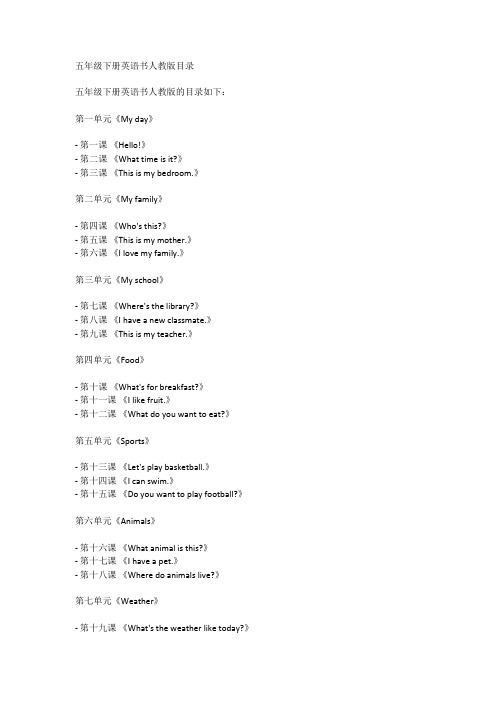
五年级下册英语书人教版目录五年级下册英语书人教版的目录如下:第一单元《My day》- 第一课《Hello!》- 第二课《What time is it?》- 第三课《This is my bedroom.》第二单元《My family》- 第四课《Who's this?》- 第五课《This is my mother.》- 第六课《I love my family.》第三单元《My school》- 第七课《Where's the library?》- 第八课《I have a new classmate.》- 第九课《This is my teacher.》第四单元《Food》- 第十课《What's for breakfast?》- 第十一课《I like fruit.》- 第十二课《What do you want to eat?》第五单元《Sports》- 第十三课《Let's play basketball.》- 第十四课《I can swim.》- 第十五课《Do you want to play football?》第六单元《Animals》- 第十六课《What animal is this?》- 第十七课《I have a pet.》- 第十八课《Where do animals live?》第七单元《Weather》- 第十九课《What's the weather like today?》- 第二十课《I like sunny days.》- 第二十一课《I don't like rainy days.》第八单元《Holidays》- 第二十二课《What holiday is it today?》- 第二十三课《I'm going on a trip.》- 第二十四课《Happy New Year!》五年级下册英语书人教版的教材内容涵盖了英语学习的基础知识,包括单词、句型和语法等,并且以日常生活的主题为主,包括自我介绍、认识家人、学校生活、食物、运动、动物、天气、假日等。
小学五年级下册英语单词
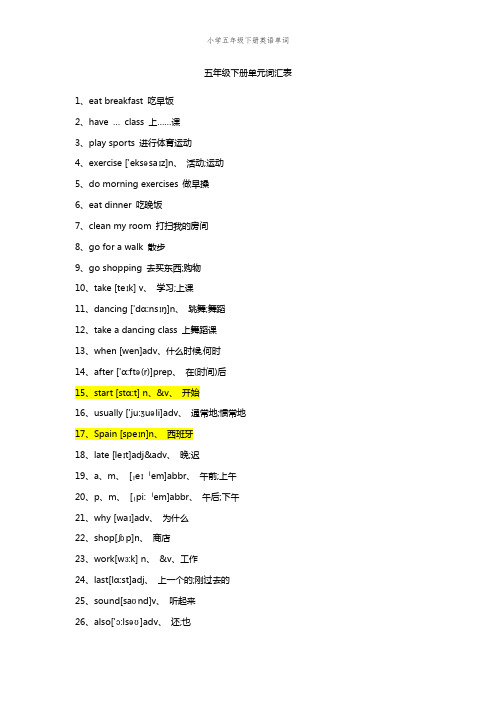
五年级下册单元词汇表1、eat breakfast 吃早饭2、have …class 上……课3、play sports 进行体育运动4、exercise ['eksəsaɪz]n、活动;运动5、do morning exercises 做早操6、eat dinner 吃晚饭7、clean my room 打扫我的房间8、go for a walk 散步9、go shopping 去买东西;购物10、take [teɪk] v、学习;上课11、dancing ['dɑ:nsɪŋ]n、跳舞;舞蹈12、take a dancing class 上舞蹈课13、when [wen]adv、什么时候,何时14、after ['ɑ:ftə(r)]prep、在(时间)后15、start [stɑ:t] n、&v、开始16、usually ['ju:ʒuəli]adv、通常地;惯常地17、Spain [speɪn]n、西班牙18、late [leɪt]adj&adv、晚;迟19、a、m、[ˌeɪˈem]abbr、午前;上午20、p、m、[ˌpi: ˈem]abbr、午后;下午21、why [waɪ]adv、为什么22、shop[ʃɒp]n、商店23、work[wɜ:k] n、&v、工作24、last[lɑ:st]adj、上一个的;刚过去的25、sound[saʊnd]v、听起来26、also['ɔ:lsəʊ]adv、还;也27、busy['bɪzi]adj、忙的28、need[ni:d]n、&v、需要29、play[pleɪ]n、戏剧;剧本30、letter['letə(r)]n、信31、live[lɪv]v、居住32、island[ˈaɪlənd]n、岛33、always['ɔ:lweɪz]adv、总就是;一直34、cave[keɪv]n、山洞;洞穴35、go swimming 去游泳36、win[wɪn]v、获胜37、spring[sprɪŋ]n、春天38、summer['sʌmə]n、夏天39、autumn['ɔ:təm]n、秋天40、winter['wɪntə]n、冬天41、season['si:zn]n、季节42、picnic['pɪknɪk]n、野餐43、go on a picnic 去野餐44、pick [pɪk]v、摘;采集45、snowman['snəʊmæn]n、雪人46、make a snowman 堆雪人47、go swimming 去游泳48、which [wɪtʃ] pron、哪一个49、best [best] adv、最;最高程度地50、snow[snəʊ]n、雪51、good job 做得好52、because[bɪ'kɒz]conj、因为53、vacation[və'keɪʃn]n、假期54、all[ɔ:l]pron、全;完全55、pink [pɪŋk] adj、粉色;粉色的56、lovely['lʌvli]adj、可爱的;美丽的57、leaf [li:f] n、叶子(复数leaves[li:vz])58、fall[fɔ:l]v、落下;【美】秋天59、paint[peɪnt]v、用颜料绘画60、January ['dʒænjuəri]n、一月61、February ['februəri]n、二月62、March [mɑ:tʃ]n、三月63、April ['eɪprəl]n、四月64、May [meɪ]n、五月65、June [dʒu:n]n、六月66、July [dʒu'laɪ]n、七月67、August ['ɔ:gəst]n、八月68、September [sep'tembə(r)]n、九月69、October [ɒk'təʊbə(r)]n、十月70、November [nəʊ'vembə(r)]n、十一月71、December [dɪ'sembə(r)]n、十二月72、few [fju:] adj、不多;很少73、a few 一些74、thing[θɪŋ]n、事情75、meet[mi:t]v、&n、集会;开会76、sports meet 运动会77、Easter[ˈi:stə(r)]n、复活节78、trip [trɪp]n、&v、旅行79、year [jɪə(r)]n、年80、plant [plɑ:nt]v、种植81、contest [ˈkɒntest]v、&n、比赛;竞赛82、the Great wall 长城83、national ['næʃnəl]adj、国家的84、National Day 国庆日85、American[ə'merɪkən]n、美国人;美国的86、Thanksgiving[ˌθæŋks'ɡɪvɪŋ]n、感恩节87、Christmas['krɪsməs]n、圣诞节88、holiday[ˈhɒlədeɪ]n、假日;节日89、game[geɪm]n、游戏90、roll[rəʊl]v、滚动91、look for 寻找92、chocolate [ˈtʃɒklət] n、巧克力93、bunny[ˈbʌni]n、(用作儿语)兔子94、RSVP(尤用于请柬)请赐复95、by [baɪ]prep、在……之前96、first(1st)[fɜ:st]n、第一(的)97、second(2nd)['sekənd]adj、第二(的)98、third(3rd)[θɜ:d]adj、第三(的)99、fourth(4th)[fɔ:θ]adj、第四(的)100、fifth(5th)[fɪfθ]adj、第五(的)101、twelfth(12th)[twelfθ]adj、第十二(的)102、twentieth(20th)['twentɪəθ]adj、第二十(的) 103、twenty-first(21st)['twentɪ'fɜ:st]adj、第二十一(的) 104、twenty-third(23rd)[ˌtwentɪ'θɜ:d]adj、第二十三(的) 105、thirtieth(30th)['θɜ:tɪəθ]adj、第三十(的)106、special['speʃl]adj、特殊的;特别的107、fool[fu:l]n、蠢人;傻瓜108、kitten[ˈkɪtn]n、小猫109、diary [ˈdeəri]n、日记110、still[stɪl]adv、仍然;依旧;还就是111、noise[nɔɪz]n、声音;响声;噪音112、fur[fɜ:(r)]n、(某些动物的)浓密的软毛113、open[ˈəʊpən]adj、开着的114、walk[wɔ:k]n、&v、行走115、mine[maɪn]pron、我的116、yours[jɔ:z]pron、您(们)的117、his[hɪz]pron、她的118、hers[hɜ:z]pron、她的119、theirs[ðeəz]pron、她们的;她们的;它们的120、ours[ˈaʊəz]pron、我们的121、climbing[ˈklaɪmɪŋ]v、(climb[klaɪm]的-ing形式) (正在)攀登;攀爬122、eating[ˈi:tɪŋ]v、(eat的-ing形式)(正在)吃123、playing[ˈpleɪɪŋ]v、(play的-ing形式)(正在)玩耍124、jumping['dʒʌmpɪŋ]v、(jump[dʒʌmp]的-ing形式)(正在)跳125、drinking[ˈdrɪŋkɪŋ]v、(drink的-ing形式)(正在)喝(水)126、sleeping['sli:pɪŋ]v、(sleep[sli:p]的-ing形式)127、each[i:tʃ]pron、每一;各个128、other[ˈʌðə(r)]pron、&adj、其她129、each other 相互130、excited[ɪk'saɪtɪd]adj、激动的131、like[laɪk]conj、像……那样132、doing morning exercises (正在)做早操133、having …class(正在)上……课134、eating lunch (正在)吃午饭135、reading a book (正在)瞧书136、listening to music (正在)听音乐137、keep[ki:p]v、保持某种状态138、keep to the right 靠右139、keep your desk clean 保持您的课桌干净140、talk quietly 小声讲话141、turn [tɜ:n]n、顺序142、take turns 按顺序来143、bamboo [ˌbæmˈbu:] n、竹子144、its [ɪts](指事物、动物或幼儿)它的;她的;她的145、show[ʃəʊ]v、给人瞧;指引146、anything[ˈeniθɪŋ]pron、任何事物147、else[els]adv、另外;其她148、exhibition[ˌeksɪˈbɪʃn] n、展览149、say [seɪ]v、说、讲150、have a look 瞧一瞧151、sushi[ˈsu:ʃi]n、寿司152、teach[ti:tʃ]v、教153、sure[ʃʊə]adv&adj、(表示同意)当然154、Canadian[kəˈneɪdiən] adj、加拿大的155、Spanish[ˈspænɪʃ]adj、西班牙的。
人教版pep五年级下册英语课文
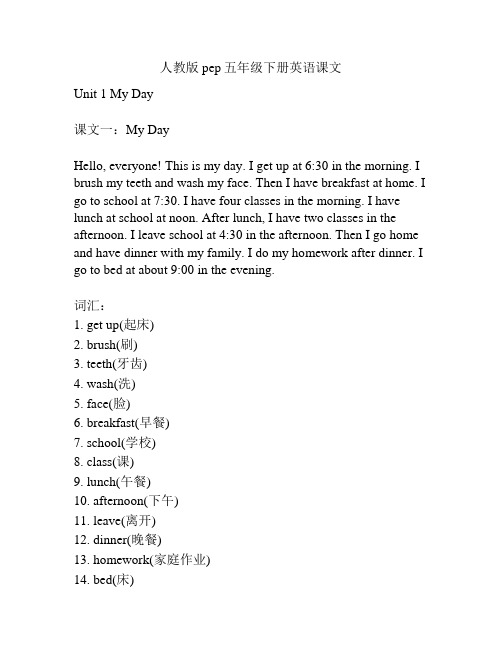
人教版pep五年级下册英语课文Unit 1 My Day课文一:My DayHello, everyone! This is my day. I get up at 6:30 in the morning. I brush my teeth and wash my face. Then I have breakfast at home. I go to school at 7:30. I have four classes in the morning. I have lunch at school at noon. After lunch, I have two classes in the afternoon. I leave school at 4:30 in the afternoon. Then I go home and have dinner with my family. I do my homework after dinner. I go to bed at about 9:00 in the evening.词汇:1. get up(起床)2. brush(刷)3. teeth(牙齿)4. wash(洗)5. face(脸)6. breakfast(早餐)7. school(学校)8. class(课)9. lunch(午餐)10. afternoon(下午)11. leave(离开)12. dinner(晚餐)13. homework(家庭作业)14. bed(床)课文二:What Can You Do?Hi, I'm Jim. I can fly a kite. It's fun. Can you fly a kite? Look, I can ride a bike, too. I often go to the park with my sister. She can swim. She swims very well. Can you swim? My brother can paint. He likes painting very much. He can paint animals and trees. Can you paint? We can do many things. How about you?词汇:1. fly(飞)2. kite(风筝)3. ride(骑)4. bike(自行车)5. park(公园)6. swim(游泳)7. brother(兄弟)8. paint(画)9. animals(动物)10. trees(树木)课文三:What Do You Like?I am Amy. I like animals. I have two cats at home. They are cute. I like running, too. I often run in the park. I like fruit. Apples and bananas are my favourite. I don't like vegetables. What about you? What do you like? Do you like animals? Do you like running? Do you like fruit? Do you like vegetables? Tell me, please.词汇:1. animals(动物)2. cats(猫)3. running(跑步)4. park(公园)5. fruit(水果)6. apples(苹果)7. bananas(香蕉)8. vegetables(蔬菜)课文四:What Can You Do?I'm Jack. I'm good at football. I play football with my friends after school. John is good at basketball. He plays basketball with his friends after school. Tony is good at table tennis. He plays table tennis with his father on weekends. What are you good at? Come and join us. Let's play together.词汇:1. football(足球)2. basketball(篮球)3. table tennis(乒乓球)4. friends(朋友)5. school(学校)6. play(玩)7. father(父亲)8. weekends(周末)Unit 2 I Love Sports课文一:I Love SportsHello, everyone! My name is Kate. I love sports very much. I like running, jumping, and swimming. Running is my favourite sport. I run in the park every morning. It makes me feel very happy. Jumping is also fun. I jump rope with my friends after school. Swimming is good for our health. I often swim in the swimming pool on weekends. What about you? Do you love sports?词汇:1. sports(运动)2. running(跑步)3. jumping(跳跃)4. swimming(游泳)5. favourite(最喜爱的)6. park(公园)7. rope(绳子)8. friends(朋友)9. health(健康)10. swimming pool(游泳池)11. weekends(周末)课文二:Sports CollectionHi, my name is Li Ming. I have a sports collection. I have a football, a basketball, a tennis racket, a ping-pong bat, and askipping rope. I like playing sports very much. I often play football and basketball with my friends. We have a great time. I also like playing tennis and ping-pong with my father. It's a good way to keep healthy. Skipping rope is an interesting sport. I skip rope with my sister every day. It's fun.词汇:1. sports(运动)2. collection(收藏)3. football(足球)4. basketball(篮球)5. tennis(网球)6. ping-pong(乒乓球)7. skipping rope(跳绳)8. friends(朋友)9. healthy(健康)10. father(父亲)11. sister(姐妹)课文三:I Like Playing BasketballHi, I'm Tom. I like playing basketball. I play basketball with my friends after school. They are all good players. We often have basketball matches. We have two teams. The red team and the blue team. We always have fun playing basketball. My favourite basketball player is Yao Ming. He is very tall and strong. What about you? Who is your favourite basketball player?词汇:1. basketball(篮球)2. friends(朋友)3. players(球员)4. matches(比赛)5. red team(红队)6. blue team(蓝队)7. fun(有趣的)8. favourite(最喜爱的)9. player(球员)10. tall(高的)11. strong(强壮的)课文四:I Can SwimHi, I'm Lisa. I can swim. I learnt how to swim when I was six years old. My father taught me. He is a good swimmer. We often go swimming together. I like swimming very much. It's good for our health. I can swim breaststroke, backstroke, and freestyle. What about you? Can you swim? Let's swim together.词汇:1. swim(游泳)2. learnt(学会)3. father(父亲)4. together(一起)5. breaststroke(蛙泳)6. backstroke(仰泳)7. freestyle(自由泳)8. health(健康)Unit 3 My Weekend Plan课文一:My Weekend PlanHello, everyone! This is my weekend plan. On Saturday morning, I'm going to read books at home. In the afternoon, I'm going to buy some clothes with my mother. On Sunday morning, I'm going to the park with my friends. We're going to have a picnic. In the afternoon, I'm going to visit my grandparents. They live in the countryside. I like spending time with them. That's my weekend plan. What about you?词汇:1. weekend(周末)2. read(阅读)3. books(书)4. buy(购买)5. clothes(衣服)6. mother(母亲)7. park(公园)8. friends(朋友)9. picnic(野餐)10. visit(拜访)11. grandparents(祖父母)12. countryside(乡村)课文二:Let's Go CampingHi, I'm Mike. Let's go camping this weekend. We're going to camp in the mountains. We're going to hike in the morning. We're going to see the sunrise. It's beautiful. We're going to have a barbecue in the afternoon. We're going to roast marshmallows, and we're going to sing songs around the fire. We're going to sleep in tents at night. It's going to be fun. Are you ready for camping?词汇:1. camping(野营)2. mountains(山)3. hike(远足)4. sunrise(日出)5. barbecue(烧烤)6. marshmallows(棉花糖)7. fire(火)8. sleep(睡觉)9. tents(帐篷)10. fun(有趣的)课文三:My Weekend PlanHi, I'm Jane. This is my weekend plan. On Saturday morning, I'm going to play the piano. I have a music lesson at home. In the afternoon, I'm going to the cinema with my friends. We're going to watch a movie. On Sunday morning, I'm going to visit my aunt. She lives in the city. In the afternoon, I'm going to do someshopping with my mother. We're going to buy some food and clothes. That's my weekend plan. What's your plan?词汇:1. weekend(周末)2. play(弹)3. piano(钢琴)4. music lesson(音乐课)5. cinema(电影院)6. movie(电影)7. visit(拜访)8. aunt(姑妈)9. city(城市)10. shopping(购物)11. food(食品)12. clothes(衣服)课文四:What Are You Going to Do?Hi, I'm Lily. What are you going to do this weekend? I'm going to have a birthday party on Saturday. My cousin and my friends are coming. We're going to eat cake and ice-cream. We're also going to play games. On Sunday, I'm going to the library. I'm going to read some storybooks. What about you? What are you going to do this weekend? Let's share our plans.词汇:1. birthday party(生日聚会)2. cousin(表兄弟姐妹)3. friends(朋友)4. eat(吃)5. cake(蛋糕)6. ice-cream(冰淇淋)7. play games(玩游戏)8. library(图书馆)9. read(阅读)10. storybooks(故事书)。
- 1、下载文档前请自行甄别文档内容的完整性,平台不提供额外的编辑、内容补充、找答案等附加服务。
- 2、"仅部分预览"的文档,不可在线预览部分如存在完整性等问题,可反馈申请退款(可完整预览的文档不适用该条件!)。
- 3、如文档侵犯您的权益,请联系客服反馈,我们会尽快为您处理(人工客服工作时间:9:00-18:30)。
Oliver:Autumn is my favourite season. I really like the colours. ChenJie:I like autumn ,too. We usually have a school trip in autumn. Oliver:Great ! When is the trip this year? ChenJie:It's in October.We'll go to the Great Wall.
we'll= I'll= they'll= he'll =
we will I will they will he will 按我
.......
China
chicken lunch teacher
中国 鸡肉
sheep fish shirt shorts
绵羊 鱼 衬衫 短裤
午餐
老师
/ch/
/sh/
The teacher is nice . The chicken is cheap . The fish is fresh .
The shirt is short .
really
colours usually this year 今年
the Great Wall 长城 love we'll = we will
tell her a story
cook
1.Read
the dialogue with your parter .
2.
Talk about what you will do on
Mother’s Day with your classmates.
3.Recite
the dialogue .
it's
= it is
Let‘s check
love
we'll
= we will
the Great Wall
usually it's = it is
really
colours
this year
1.Which season does Oliver like best ?
2.What about ChenJie ? 3.When is the school trip this year ? 4.Where will they go ?
Oliver:Cool ! I love the Great Wall.
ChenJie: I'll John:I'll
cook for my mother .
make a card . Nhomakorabeasing to her
I will
say"Thank you" write her a letter
play the pipa for her
